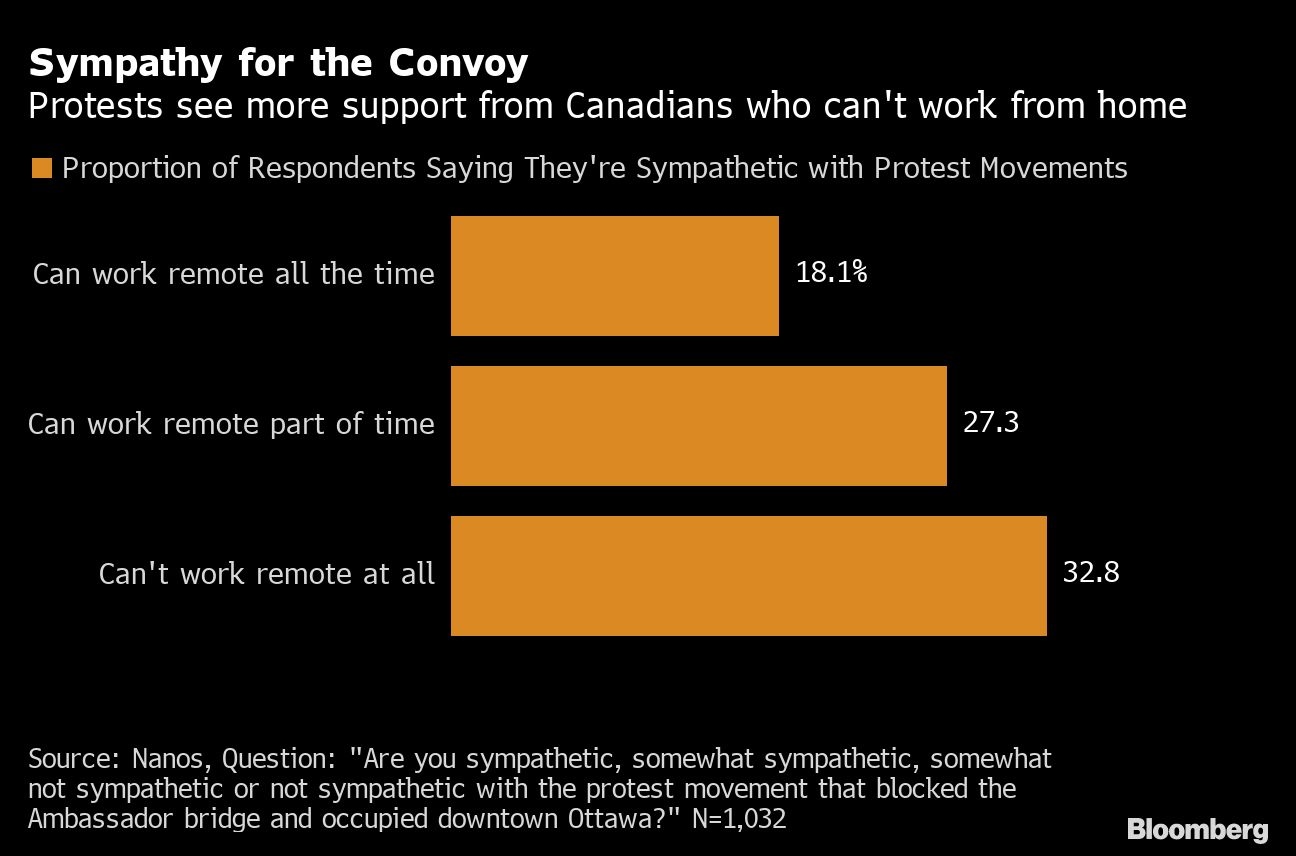Canadian trucker protests reveal fault lines by age, work status
, Bloomberg News
Mar 7, 2022
Canadians have little sympathy for the erstwhile protesters who occupied downtown Ottawa for weeks and closed border crossings. But younger Canadians and those who can’t work from home register more support for the demonstrators, calling attention to a new potential political challenge for Prime Minister Justin Trudeau’s government.
The blockades were unpopular across all groups, according to a Nanos Research Group survey for Bloomberg News fielded in the days after authorities retook control of downtown Ottawa. Only 22 per cent of Canadians said they were at least somewhat sympathetic with the anti-government movement, compared with three-quarters who said they weren’t sympathetic.
But groups known to have experienced more isolation or work inflexibility during the pandemic were more likely to respond positively about the demonstrators, who drove columns of big-rig trucks into the capital city to protest against COVID-19 restrictions. Offshoot demonstrations spread to key border crossings, prompting Trudeau to invoke emergency police powers.
Roughly 33 per cent of people who couldn’t work remotely or digitally showed at least some sympathy for the protesters. By contrast, only about 18 per cent of Canadians who didn’t need to leave home for work felt similarly. Among those who could work remotely part time, 27 per cent expressed some support.
The convoy was initially prompted by border rules that Trudeau put in place in mid-January, requiring truckers crossing the U.S.-Canada border to be vaccinated. But it quickly galvanized into a broader political protest against government authority.
“There is definitely a class divide element to this,” said Lori Turnbull, director of the School of Public Administration at Dalhousie University in Nova Scotia.

Some writers and political scientists have wondered aloud whether the protests might reflect worsening class divisions between those who work in the physical world and those who work in the digital world.
This new prospective pool of anti-government voters might explain why some of the more populist-leaning members of the Conservative Party expressed public support for the truckers, at least initially.
The polling suggests that negative sentiment toward government goes beyond the working-class men whom Trudeau has long struggled to win over.
Indeed, younger Canadians -- a group more likely to have lost work during the pandemic and less likely to have gotten seriously ill -- also supported the truckers at higher levels than Canadians overall. About 28 per cent of respondents between 18 to 34 years old expressed at least some sympathy for them, versus 16 per cent for those 55 years and older. Younger Canadians were also more likely not to have a work from home option, with one-third of them unable to work remotely.

That trend tracks with other polling that shows rising support for Conservatives among younger voters. The share of voters between 18 and 29 who support the Conservatives jumped to 34 per cent at the end of February, from about 20 per cent at the end of January, according to separate weekly polling by Nanos.
Some traditional political fault lines were also evident in the Nanos survey for Bloomberg News, with higher sympathy levels for the truckers in western Canada, where support for Trudeau’s government tends to be low.
Hundreds of semis and other heavy vehicles blockaded the downtown of Canada’s capital city for three weeks last month in demonstrators that also inspired offshoots along key U.S. border crossings, including the Ambassador Bridge to Detroit. Trudeau lifted the emergency edict on Feb. 23, once all blockades were cleared.
The hybrid telephone and online random survey of 1,032 Canadians was conducted between Feb. 23 and Feb. 24. It has a margin of error of 3.1 percentage points.
No comments:
Post a Comment